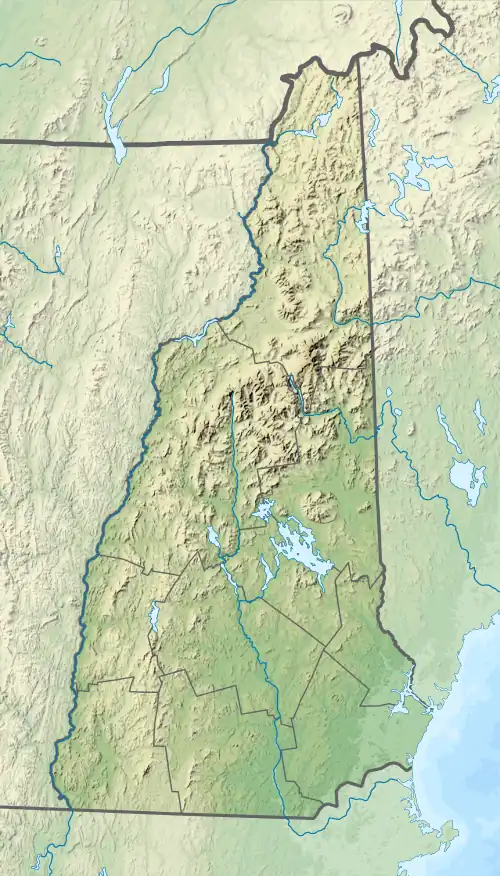| Mount Madison | |
|---|---|
 East elevation of Mount Madison, seen from New Hampshire Route 16 | |
| Highest point | |
| Elevation | 5,367 ft (1,636 m) |
| Prominence | 466 ft (142 m)[1] |
| Parent peak | Mount John Quincy Adams[1] |
| Listing | White Mountain 4000-Footers |
| Coordinates | 44°19′42″N 71°16′40″W / 44.32833°N 71.27778°W[2] |
| Geography | |
  | |
| Country | United States |
| State | New Hampshire |
| District | Coös County |
| Subdivision | Low and Burbank's Grant, Thompson & Meserve's Purchase |
| Parent range | Presidential Range |
| Topo map | USGS Mount Washington |
| Climbing | |
| Easiest route | Hike |
Mount Madison is a 5,367-foot (1,636 m) mountain in the Presidential Range of New Hampshire in the United States. It is named after the fourth U.S. President, James Madison.
Mountains in the Presidential Range are named for U.S. presidents, with the tallest (Mount Washington) named for the first president, the second tallest (Mount Adams) for the second president, and so on. However, due to a surveying error, Mount Monroe, named after the fifth president, James Monroe, is actually 22 feet (6.7 m) taller than Mount Madison.
There are many hiking trails on the mountain. A stretch of the Appalachian Trail traverses just below its summit on the Osgood Trail. The Madison Spring Hut, maintained by the Appalachian Mountain Club, is nestled between Mount Madison and Mount Adams and provides rustic lodging in the summer. Reservations generally need to be made far in advance.
Mount Madison is the northernmost peak in the Presidentials. Like most of the range, its summit is above treeline. Due to high winds and low temperatures, hypothermia is a danger even in the summer.
Climate
There is no weather station at the summit, but this climate table contains interpolated data for an area around the summit. Mount Madison has a subarctic climate (Köppen Dfc).
| Climate data for Mount Madison 44.3260 N, 71.2845 W, Elevation: 4,865 ft (1,483 m) (1991–2020 normals) | |||||||||||||
|---|---|---|---|---|---|---|---|---|---|---|---|---|---|
| Month | Jan | Feb | Mar | Apr | May | Jun | Jul | Aug | Sep | Oct | Nov | Dec | Year |
| Mean daily maximum °F (°C) | 16.5 (−8.6) |
17.9 (−7.8) |
24.0 (−4.4) |
34.3 (1.3) |
47.3 (8.5) |
55.8 (13.2) |
60.2 (15.7) |
59.0 (15.0) |
53.4 (11.9) |
41.1 (5.1) |
30.3 (−0.9) |
22.2 (−5.4) |
38.5 (3.6) |
| Daily mean °F (°C) | 8.8 (−12.9) |
9.8 (−12.3) |
16.3 (−8.7) |
27.6 (−2.4) |
41.4 (5.2) |
50.7 (10.4) |
55.7 (13.2) |
54.2 (12.3) |
47.9 (8.8) |
35.3 (1.8) |
23.9 (−4.5) |
14.4 (−9.8) |
32.2 (0.1) |
| Mean daily minimum °F (°C) | 1.0 (−17.2) |
1.6 (−16.9) |
8.5 (−13.1) |
20.8 (−6.2) |
35.5 (1.9) |
45.7 (7.6) |
51.1 (10.6) |
49.5 (9.7) |
42.4 (5.8) |
29.5 (−1.4) |
17.5 (−8.1) |
6.7 (−14.1) |
25.8 (−3.4) |
| Average precipitation inches (mm) | 5.56 (141) |
5.04 (128) |
6.20 (157) |
7.13 (181) |
6.80 (173) |
7.91 (201) |
7.99 (203) |
6.64 (169) |
6.70 (170) |
9.80 (249) |
7.67 (195) |
7.09 (180) |
84.53 (2,147) |
| Source: PRISM Climate Group[3] | |||||||||||||
Gallery
 Mount Madison seen from Mount Adams' summit
Mount Madison seen from Mount Adams' summit Mount Madison from Mount Adams
Mount Madison from Mount Adams Madison Spring Hut in the col between Mount Madison and Mount Adams
Madison Spring Hut in the col between Mount Madison and Mount Adams Mount Madison from the Androscoggin River, by William Hart, 1862
Mount Madison from the Androscoggin River, by William Hart, 1862
See also
- Four-thousand footers of New Hampshire
- Randolph Mountain Club
References
- 1 2 "Mount Madison". Peakbagger.com. Retrieved 2015-01-18.
- ↑ "Mount Madison". Geographic Names Information System. United States Geological Survey, United States Department of the Interior. Retrieved 2015-01-18.
- ↑ "PRISM Climate Group, Oregon State University". PRISM Climate Group, Oregon State University. Retrieved October 20, 2023.
To find the table data on the PRISM website, start by clicking Coordinates (under Location); copy Latitude and Longitude figures from top of table; click Zoom to location; click Precipitation, Minimum temp, Mean temp, Maximum temp; click 30-year normals, 1991-2020; click 800m; click Retrieve Time Series button.